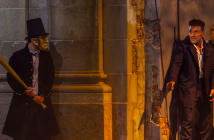
Editor’s Note: Triple 9 is now playing in wide theatrical release.
To be a cop movie in this day and age, you need to bring a unique angle to the table, something beyond just heists and double-crossings. End of Watch gave us that in 2012 with a pseudo found-footage perspective, imbuing Jake Gyllenhaal and Michael Peña’s friendship with tons of realism and urgency only found in such a style. We’ve seen so many mysteries, so many crime thrillers, and unless Charlie Kaufman starts writing them, they’ll continue to feel partially (or wholly) familiar. John Hillcoat’s latest, Triple 9, is a tale of corrupt cops, heists, and murder, but as none of that’s particularly new, its intrigue lies beyond plot, somewhere entirely separate.
If there’s a prominent lead for us to invest in, it’s not the rookie cop played by Casey Affleck, it’s the corruption that binds every other character together.
 Instead of looking to captivate the audience with expansive characters and story arcs, Triple 9 offers a moody atmosphere and a look at crime that’s more existential than straightforward. If there’s a prominent lead for us to invest in, it’s not the rookie cop played by Casey Affleck, it’s the corruption that binds every other character together. Here, corruption is a web connecting families to criminals, and criminals to a larger, looming presence which blinds them from guilt. In this film, that presence gives a motley band of criminals and corrupt cops one option in order to pull off a grand heist: Kill an officer for the sake of ample time. Scenes in which they discuss this are lit with a sinister red, conveying that corruption is omnipresent, lurking in the shadows, enveloping its subjects at opportune moments. Red is also present throughout as a constant symbol, warning of crime’s impending collision with those who oppose it, and depicting the inflammation of masculine rage in a getaway vehicle very cleverly during the opening scene.
Instead of looking to captivate the audience with expansive characters and story arcs, Triple 9 offers a moody atmosphere and a look at crime that’s more existential than straightforward. If there’s a prominent lead for us to invest in, it’s not the rookie cop played by Casey Affleck, it’s the corruption that binds every other character together. Here, corruption is a web connecting families to criminals, and criminals to a larger, looming presence which blinds them from guilt. In this film, that presence gives a motley band of criminals and corrupt cops one option in order to pull off a grand heist: Kill an officer for the sake of ample time. Scenes in which they discuss this are lit with a sinister red, conveying that corruption is omnipresent, lurking in the shadows, enveloping its subjects at opportune moments. Red is also present throughout as a constant symbol, warning of crime’s impending collision with those who oppose it, and depicting the inflammation of masculine rage in a getaway vehicle very cleverly during the opening scene.
John Hillcoat frames everything as downright grimy in the best possible way, directing action that’s kinetic and urgent, a kind-of scary contrast to the everyday life it chooses to interrupt. We see criminal activity as a living, breathing, always-moving thing, just offscreen and out of reach. The longer it takes to catch up to, the more damage it does. Take for example a scene in which Casey Affleck and Anthony Mackie are chasing a criminal through a housing development with no backup. Leading the chase, Mackie speeds up, sprinting out of Affleck’s sight. After some more running and scrambling, Affleck finally comes across Mackie against a wall with the man, wrestling for a gun. Only viewing the struggle already in session, Affleck stands there for a moment, unsure of what to do. There’s a sense of helplessness to be found there, which largely fuels the horrific undercurrent flowing through everything. Atticus Ross’ haunting score accompanies all of this, and makes it even more thrilling to watch unfold.
Triple 9 is a tale of corrupt cops, heists, and murder, but as none of that’s particularly new, its intrigue lies beyond plot, somewhere entirely separate.
As the film moves forward, more characters come face-to-face with either corruption or the corrupted, and reactions vary. Not all criminals have their guilt blinded by corruption, not all good people do the right thing. Uncertainty reigns, and we’re left with thoughts that we’ve had before, but haven’t reflected on quite so directly: “We aren’t necessarily who we think we are. We haven’t been subjected to everything the world has to throw at us. That world, doing said throwing, is about as imperfect as we are.” But though these statements are harrowing, Triple 9 doesn’t impart them to us offhandedly. They’re capped off with the idea that, sometimes, it takes imperfection to beat imperfection. While a criminal may kill a good man, a good man may kill a criminal. We’re not the only lambs being driven to the slaughter.
On the surface, Triple 9 is a story of cops, double-crossing, and other things we’ve come to expect from this genre. Underneath, it’s an otherworldly meditation on humankind’s permeability.
On the surface, John Hillcoat's Triple 9 is a story of cops, double-crossing and other things we've come to expect from this genre. Underneath, it's an otherworldly meditation on humankind's permeability.



